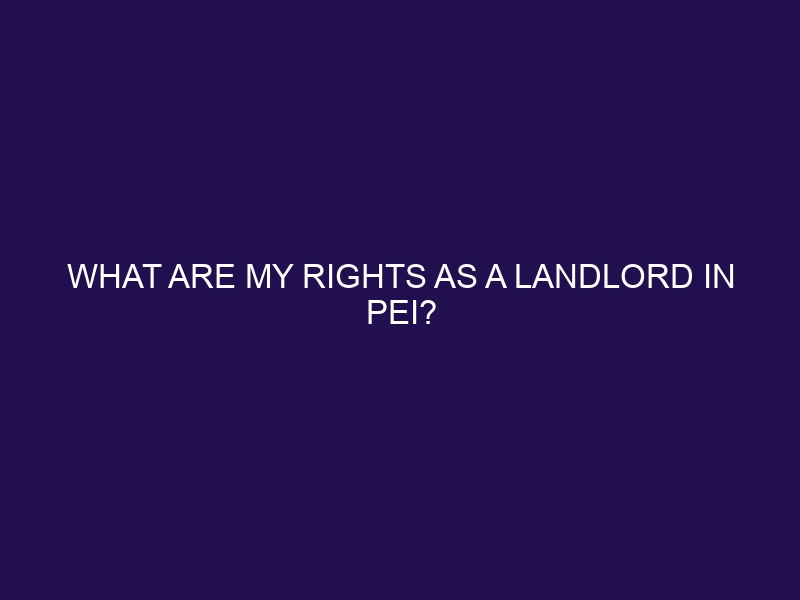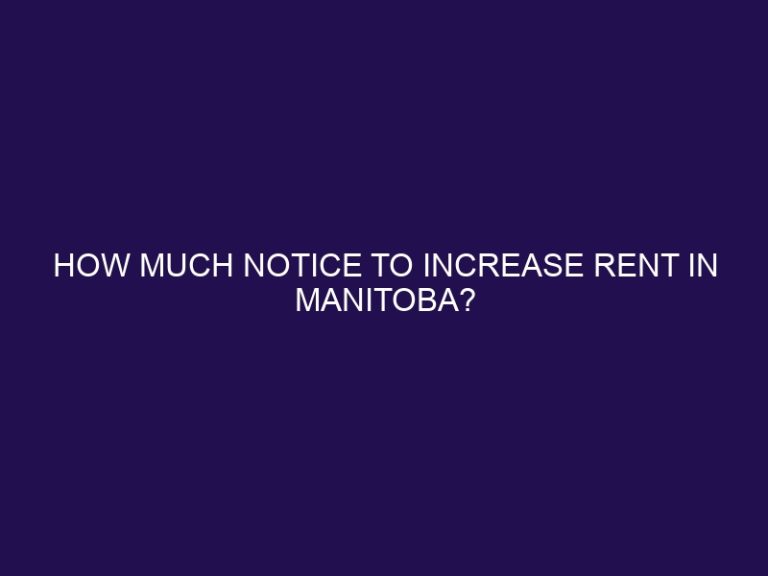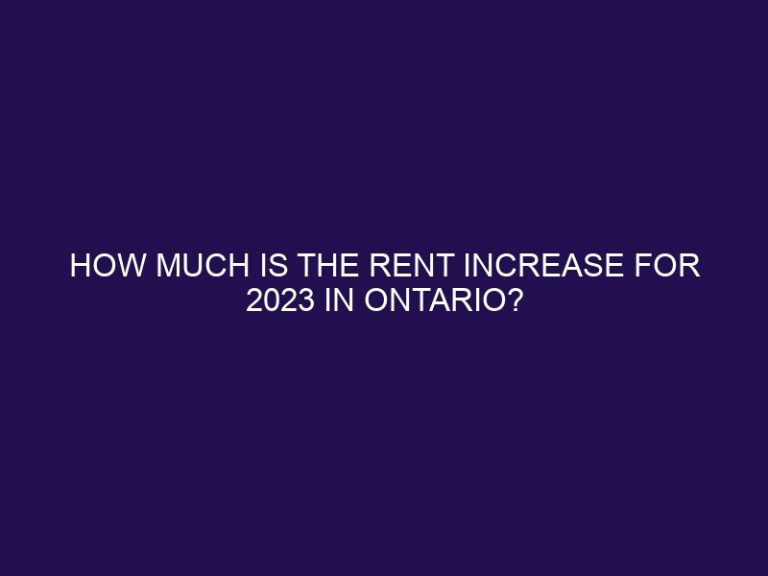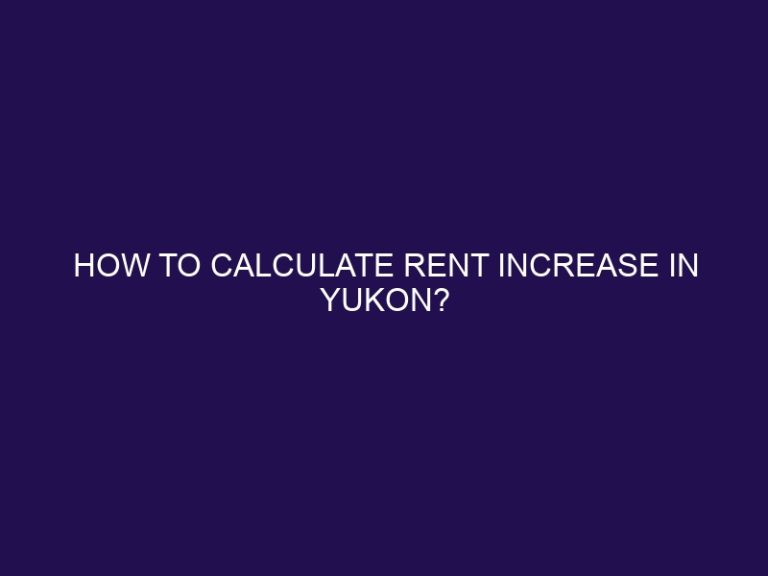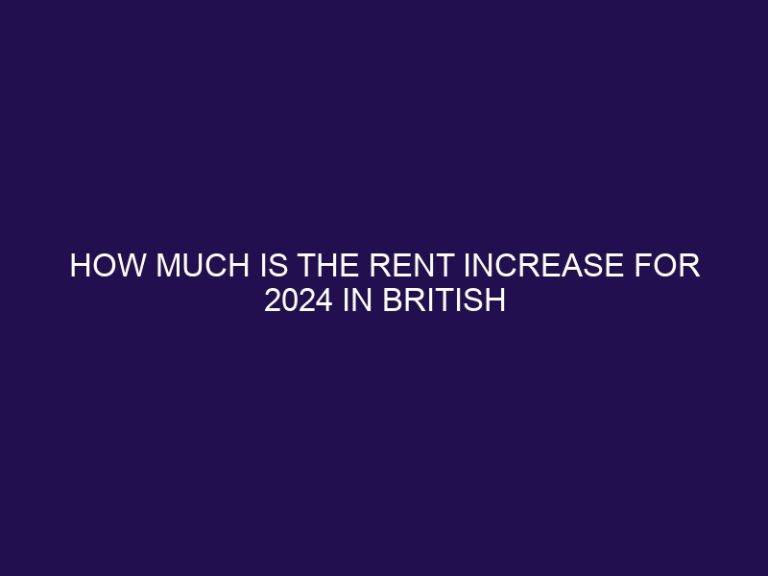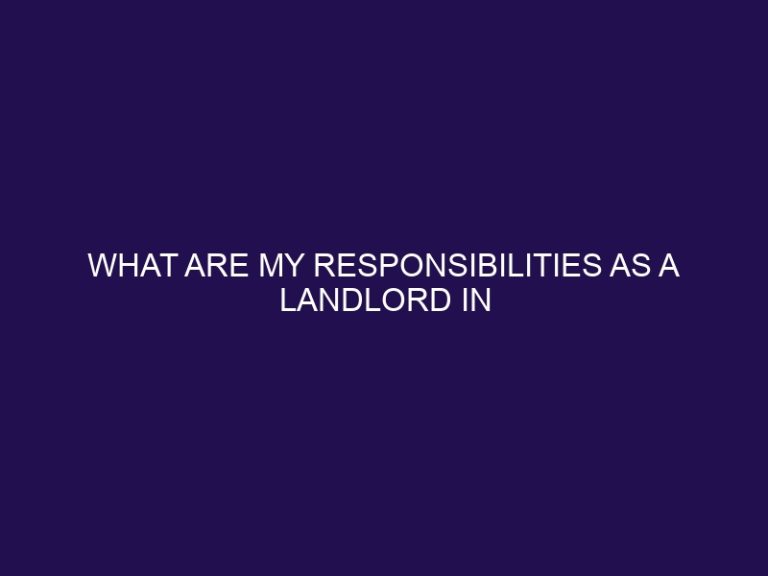What are my rights as a landlord in PEI?
.jpg)
Being a landlord in Prince Edward Island (PEI) comes with certain rights and responsibilities. Understanding the rental laws in PEI is essential to ensure a smooth and legal landlord-tenant relationship.
Under the Landlord and Tenant Act and the Residential Tenancies Act, landlords in PEI have specific rights and obligations. This article aims to provide an overview of the rights of landlords in PEI and the legal obligations they must fulfill.
Understanding the key points of the Residential Tenancies Act is crucial for landlords in PEI. It covers important aspects such as rent collection, rent amount determination, eviction procedures, entry into rental premises, property maintenance and repairs, enforcement of rules and regulations, and seeking compensation for damages.
PEI landlords have the right to collect rent from tenants and set the rent amount, keeping in mind any applicable rent increase regulations. Landlords also have the right to evict tenants following proper eviction procedures and to enter the rental premises for specific reasons, ensuring they respect tenant privacy rights.
Furthermore, landlords have the responsibility to provide a safe and habitable rental unit, comply with rent increase regulations, follow proper eviction procedures, handle security deposits appropriately, and protect tenant privacy rights. Failure to fulfill these legal obligations can result in legal consequences for landlords.
As a resource for PEI landlords, the article highlights the PEI Office of Residential Tenancies where landlords can find valuable information and guidance. seeking legal advice for landlord matters is recommended to ensure compliance with the relevant laws and regulations in PEI.
By understanding their rights and legal obligations, landlords in PEI can effectively manage their rental properties and foster a positive landlord-tenant relationship while complying with the rental laws in PEI.
Key Takeaways:
- Landlord’s right to collect rent: Landlords in PEI have the right to collect rent from their tenants as stated in the Residential Tenancies Act.
- Landlord’s right to maintain and repair the property: PEI landlords have the responsibility to ensure that the rental property is properly maintained and repaired to provide a safe and habitable living environment for tenants.
- Landlord’s right to enforce rules and regulations: Landlords in PEI have the right to establish rules and regulations for their rental properties, as long as they are fair and reasonable, and provide notice to tenants.
Understanding Rental Laws in PEI
In the world of rental property management, it’s crucial to have a solid understanding of the legal framework that governs landlord-tenant relationships. So, let’s dive into the ins and outs of rental laws in PEI. We’ll explore the Landlord and Tenant Act and uncover key points for landlords outlined in the Residential Tenancies Act. Get ready to arm yourself with the knowledge you need to protect your rights and navigate the rental landscape with confidence.
Overview of Landlord and Tenant Act
The landlord and tenant act in PEI provides a framework for the rights and responsibilities of landlords and tenants. This highlights key points that landlords should be aware of. Landlords in PEI have the right to collect rent, set rent amounts, evict tenants, enter rental premises, maintain the property, enforce rules and regulations, and seek compensation for damages. They also have legal obligations to provide safe and habitable rental units, protect tenant privacy rights, follow proper eviction procedures, comply with rent increase regulations, and handle security deposits appropriately. It is important for landlords to understand and adhere to the guidelines outlined in the landlord and tenant act.
Residential Tenancies Act: Key Points for Landlords
The Residential Tenancies Act in PEI outlines key points for landlords to understand and abide by when renting out properties. Here are some important aspects to consider:
- Rights of eviction: The Residential Tenancies Act provides landlords with the right to evict a tenant if they violate the terms of the lease agreement or engage in illegal activities.
- Setting rent amount: The Residential Tenancies Act allows landlords to determine the rent amount for their properties, but they must comply with rent increase regulations and provide notice to tenants.
- Entering the rental premises: The Residential Tenancies Act grants landlords the right to enter the rental unit under specific conditions, such as making repairs, showing the property to potential tenants, or in case of emergency.
- Maintaining and repairing the property: The Residential Tenancies Act places the responsibility on landlords to ensure the rental unit is in a safe and habitable condition and must promptly address maintenance and repair issues.
- Enforcing rules and regulations: Landlords can establish reasonable rules for tenants, such as pet restrictions or noise guidelines, as long as they are in compliance with the law and the Residential Tenancies Act.
- Seeking compensation for damages: The Residential Tenancies Act grants landlords the right to seek compensation for damages to the property caused by tenants beyond normal wear and tear.
Rights and Responsibilities of PEI Landlords
As a PEI landlord, it’s crucial to understand your rights and responsibilities to ensure a smooth rental experience. In this section, we’ll dive into the various aspects of the rights and responsibilities of PEI landlords. We’ll cover topics such as rent collection, setting rent amounts, eviction processes, accessing rental premises, property maintenance and repairs, enforcing rules and regulations, as well as seeking compensation for damages. Stay tuned to discover the essential information every PEI landlord needs to know!
Right to Collect Rent
As a landlord in PEI, you have the right to collect rent from your tenants. This is one of your fundamental rights as a landlord. It is essential to ensure that your tenants pay their rent on time and in full. By exercising your right to collect rent, you can cover your expenses and maintain your rental property. As a landlord, it is crucial to understand that you must follow the proper legal procedures when collecting rent and cannot arbitrarily increase the rent amount without adhering to the rent increase regulations. Always consult the Residential Tenancies Act and the Landlord and Tenant Act to know and protect your rights as a landlord in PEI.
Right to Set Rent Amount
The right to set rent amount is a critical aspect for landlords in PEI. As per the Residential Tenancies Act, landlords possess the authority to establish the rental price for their properties. They are obligated to abide by the regulations concerning rent increases. It is essential for landlords to provide tenants with proper notice in advance before implementing any changes to the rent. Understanding and adhering to the guidelines outlined in the Act is crucial to ensure compliance and maintain a fair and transparent rental process. Fun Fact: PEI boasts a competitive rental market, experiencing an average rent increase of 3.4% in the past year.
Right to Evict a Tenant
The right to evict a tenant is a fundamental aspect of landlord rights in PEI. In PEI, landlords have the legal authority to evict a tenant under specific circumstances, including non-payment of rent, breach of the lease agreement, or causing significant damage to the property. To ensure a legal and fair eviction process, it is essential for landlords to follow the proper eviction procedures outlined in the Residential Tenancies Act. The PEI Office of Residential Tenancies can provide landlords with the necessary guidance and support when exercising their right to evict a tenant.
Interestingly, in medieval England, landlords had the right to evict tenants from their lands without any reason or notice, a practice known as “eviction without cause.” This often resulted in widespread displacement and hardship for tenants. However, over time, laws were enacted to protect tenant rights, leading to more balanced landlord-tenant relationships in modern societies.
Right to Enter the Rental Premises
Landlords in PEI have the right to enter the rental premises under certain circumstances. According to the Residential Tenancies Act, landlords can exercise their right to enter the rental unit for specific reasons such as repairs, inspections, or emergencies. It’s crucial for landlords to exercise this right responsibly and ensure that they provide the tenant with reasonable notice, typically at least 24 hours in advance. The notice should clearly state the date, time, and purpose of the entry. To maintain a positive landlord-tenant relationship and ensure a smooth process, effective communication is key. Respecting the tenants’ privacy and only entering the premises when necessary is essential. Pro-tip: Maintaining effective communication and building a good relationship with tenants can help ensure a smooth process when exercising the right to enter the rental premises.
Right to Maintain and Repair the Property
Landlords in PEI have the right to maintain and repair their rental properties to ensure they are safe and habitable for tenants. This includes addressing the condition of the property, conducting necessary repairs, and ensuring that all essential utilities are in working order. Landlords are responsible for promptly addressing any maintenance issues that arise during a tenancy. By exercising their right to maintain and repair the property, landlords can create a positive living environment for tenants and uphold their legal obligations. It is important for landlords to stay proactive in property maintenance to prevent potential issues and ensure tenant satisfaction.
Right to Enforce Rules and Regulations
The ability to enforce rules and regulations is a vital component of being a landlord in PEI. Landlords possess the right to establish and implement specific rules that tenants must adhere to while residing in the rental property. These regulations can encompass various aspects, including noise restrictions, pet guidelines, and smoking bans. By enforcing these rules, landlords ensure a peaceful and harmonious living environment for all tenants. It is crucial for landlords to guarantee that these rules are transparent, fair, and in accordance with the applicable laws and regulations to avoid any legal complications. Fun Fact: Were you aware that PEI boasts over 23,000 rental units throughout the province?
Right to Seek Compensation for Damages
As a landlord in PEI, you have the right to seek compensation for damages caused by your tenants. This legally grants you the authority to be reimbursed for the costs of repair or replacement if your tenant has caused any harm to your property. Ensuring the well-being of your investment and maintaining the impeccable condition of your property, seeking compensation for damages becomes vital. It is highly recommended to thoroughly document any damages by capturing photographs and keeping receipts for repairs. Additionally, it is important to establish effective communication with your tenant in order to streamline the compensation process. It is pertinent to adhere to proper procedures and seek legal guidance when necessary.
Legal Obligations of Landlords in PEI
As a landlord in PEI, it’s important to understand your legal obligations to ensure a smooth and fair rental experience. In this section, we’ll explore the key aspects that encompass the legal obligations of landlords in PEI. From providing a safe and habitable rental unit to protecting tenant’s privacy rights, following proper eviction procedures, complying with rent increase regulations, and handling security deposits appropriately, we’ll cover all the essential information you need to know to fulfill your responsibilities as a landlord.
Providing a Safe and Habitable Rental Unit
Providing a safe and habitable rental unit is a crucial obligation for landlords in PEI. It is their responsibility to ensure that the property meets safety standards, has proper ventilation, functioning heating and cooling systems, and secure locks. Landlords should promptly respond to repair requests and address any health or safety concerns, such as mold, pests, or electrical issues. Regular maintenance inspections can help prevent potential hazards. By fulfilling their duty of providing a safe and habitable rental unit, landlords contribute to the well-being and satisfaction of their tenants.
In 2017, a landlord in PEI faced a fine for failing to provide a safe and habitable rental unit. The tenant reported several maintenance issues, including a leaky roof and broken heating system. Unfortunately, the landlord chose to ignore the complaints, thereby putting the tenant at risk. This case serves as a reminder of the importance of landlords upholding their legal obligation to maintain a safe and habitable rental unit.
Protecting Tenant’s Privacy Rights
As a landlord in PEI, protecting your tenants’ privacy rights is of utmost importance. It is crucial to understand and respect their need for confidentiality, notice, maintenance and repairs, security measures, and communication.
Confidentiality is paramount; it is your responsibility to safeguard your tenants’ personal information and refrain from sharing it without their consent. Additionally, always provide proper notice before entering the rental premises, unless it is an emergency or you have the tenant’s permission.
When conducting maintenance and repairs, prioritize your tenants’ privacy. Ensure that necessary repairs are done but be mindful of unnecessary intrusions. This will show your respect for their privacy.
Installing and maintaining sufficient security measures is essential to guarantee tenant safety and protect their privacy. This includes measures such as proper locks and surveillance systems.
Communication is another significant aspect. Respect your tenants’ privacy by refraining from eavesdropping on conversations or snooping around their living area.
By prioritizing and protecting your tenants’ privacy rights, you can establish a positive and healthy landlord-tenant relationship while maintaining a conducive rental environment.
Following Proper Eviction Procedures
- Ensuring proper eviction procedures is crucial for landlords in PEI to protect their rights and ensure a smooth and legal process. Here are the steps to follow when evicting a tenant:
- Serve a written notice: To follow proper eviction procedures, landlords in PEI should provide the tenant with a written notice stating the reason for eviction and a reasonable time to rectify the issue.
- File an application: If the tenant fails to comply, it is important to file an application with the PEI Office of Residential Tenancies, including supporting documents, in accordance with proper eviction procedures.
- Attend the hearing: As part of following proper eviction procedures, landlords should attend the hearing and present their case to the adjudicator, providing evidence of the tenant’s non-compliance.
- Receive the eviction order: If the adjudicator decides in favor of the landlord, they will receive an eviction order that outlines the date by which the tenant must vacate the premises, in accordance with proper eviction procedures.
- Enforce the order: If the tenant still refuses to leave, the landlord may seek assistance from the sheriff’s office to enforce the eviction order, following proper eviction procedures.
Complying with Rent Increase Regulations
Complying with rent increase regulations is of utmost importance for landlords in PEI to ensure their practices are legal and fair. Here are the necessary steps to follow when increasing the rent in compliance with the regulations:
1. Review the Residential Tenancies Act: It is crucial to familiarize yourself with the specific regulations surrounding rent increases in PEI as outlined in the Act.
2. Provide Notice: Give your tenant proper written notice of the rent increase, clearly stating the new amount and the effective date. The notice period will vary depending on the length of the rental agreement.
3. Justify the Increase: It is essential to ensure that the rent increase is justified and falls within the limits set by the Act. PEI has provided specific guidelines for allowable rent increases that must be adhered to.
4. Maintain Documentation: It is recommended to keep thorough records of all communication, notices, and receipts related to the rent increase process. This documentation will serve as essential evidence if any disputes arise.
5. Follow Dispute Resolution Procedure: In the event that the tenant disputes the rent increase, it is important to follow the appropriate dispute resolution process outlined in the Residential Tenancies Act.
By strictly adhering to the rent increase regulations, landlords can maintain positive relationships with their tenants and operate within the legal framework to foster a fair rental market.
Handling Security Deposits Appropriately
To handle security deposits appropriately as a landlord in PEI, follow these steps:
- Clearly outline the terms and conditions of handling security deposits appropriately in the lease agreement.
- Collect the security deposit before the tenant moves in and provide a receipt to ensure proper handling.
- Keep the security deposit in a separate trust account as required by the Residential Tenancies Act to ensure appropriate handling.
- Inspect the rental unit at the end of the tenancy to assess any damages beyond normal wear and tear for appropriate handling of security deposits.
- Within 15 days after the tenant’s move-out, provide a written statement accounting for any deductions from the security deposit to ensure appropriate handling.
- If deductions are made, provide receipts or documentation to support the expenses and maintain appropriate handling.
- Return the remaining portion of the security deposit to the tenant within 30 days after the tenancy ends, ensuring appropriate handling of security deposits.
Resources for PEI Landlords
Are you a landlord in PEI? Looking for resources to help you navigate your rights? In this section, we will dive into valuable resources specifically tailored for PEI landlords. From the PEI Office of Residential Tenancies to seeking legal advice for landlord matters, we’ve got you covered. Discover the essential information and expert guidance that will empower you as a landlord in PEI.
PEI Office of Residential Tenancies
The PEI Office of Residential Tenancies is a valuable resource for landlords in Prince Edward Island. It provides information and guidance on rental laws, tenant disputes, eviction procedures, and more. Landlords can access forms and documents necessary for renting and managing properties, as well as get support in resolving conflicts with tenants. The office can also provide advice on legal obligations, such as maintaining a safe and habitable rental unit, protecting tenant privacy rights, and handling security deposits appropriately. Landlords in PEI should familiarize themselves with the services offered by the PEI Office of Residential Tenancies to ensure they are well-informed and compliant with the law.
Seeking Legal Advice for Landlord Matters
Seeking legal advice for landlord matters is vital when it comes to navigating the complexities of rental laws in PEI. It is highly recommended to reach out to experts such as the PEI Office of Residential Tenancies or consult professionals who specialize in landlord-tenant matters. These resources can offer invaluable guidance on rights and obligations, eviction procedures, rent increase regulations, and the proper handling of security deposits. Always remember that comprehending the legal aspects of being a landlord is absolutely crucial to safeguard your interests and ensure compliance with the applicable regulations. Seeking professional advice can provide you with valuable insights and assist you in making well-informed decisions.
Facts:
Some Facts About Landlord Rights in PEI:
- ✅ The Rental of Residential Property Act and its Regulations apply to most residential landlords in PEI. (Source: “Renting on PEI – A Guide for Landlords”)
- ✅ Landlords have the right to include provisions in rental agreements listed in the Rental of Residential Property Act. (Source: “Renting on PEI – A Guide for Landlords”)
- ✅ Landlords can request a security deposit from tenants, which cannot exceed one week’s rent for week-to-week tenancies or one month’s rent for month-to-month or yearly tenancies. (Source: “Renting on PEI – A Guide for Landlords”)
- ✅ Landlords must provide tenants with a full copy of the rental agreement within 21 days of signing, if a written agreement is used. (Source: “Renting on PEI – A Guide for Landlords”)
- ✅ Landlords are responsible for returning the security deposit plus accrued interest within ten days after the tenant moves out. (Source: “Renting on PEI – A Guide for Landlords”)
Frequently Asked Questions
What are my rights as a landlord in PEI?
As a landlord in PEI, you have certain rights and responsibilities when it comes to renting out residential properties. Here are some key points:
What is a standardized rental agreement in PEI?
A standardized rental agreement in PEI is a document that outlines the terms and conditions of the rental agreement between a landlord and a tenant. It is a recommended form that covers important aspects such as rent, security deposit, maintenance responsibilities, and more. While not mandatory, using the standardized rental agreement is highly recommended to ensure clarity and compliance with the Rental of Residential Property Act.
Can I have a fixed-term lease in PEI?
Yes, you can have a fixed-term lease in PEI. A fixed-term lease has a predetermined expiration date specified in the rental agreement. This type of lease provides both the landlord and the tenant with certainty regarding the duration of the tenancy.
What is the mailing address of the Department of Justice and Public Safety in PEI?
The mailing address of the Department of Justice and Public Safety in PEI is PO Box 2000, Charlottetown, PE C1A 7N8.
Which government is responsible for the jurisdiction of the Department of Justice and Public Safety in PEI?
The Department of Justice and Public Safety in PEI is under the jurisdiction of the Government of Prince Edward Island.
Can a verbal agreement between a landlord and tenant be legally binding in PEI?
Yes, a verbal agreement between a landlord and tenant can be legally binding in PEI. However, it is highly recommended to have a written rental agreement to clearly outline the rights and responsibilities of both parties.

